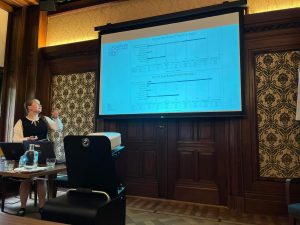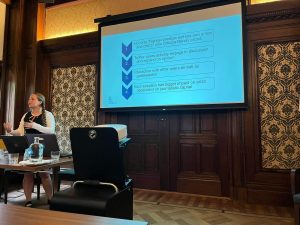I, Lore De Greve, was very proud to present my research at the prestigious, international MLA 2024 Convention in Philadelphia, where I participated in a panel on “Studying Bookish Social Media Communities”. The panel was organised and moderated by Rachel Wilson (U of Michigan, Ann Arbor) and Angelina Eimannsberger (U of Pennsylvania ). The other co-panelists were Danyse Golick (U of Toronto) and Cassandra Hradil (U of Pennsylvania).
My contribution: “Far from the Bookish Crowd: Using Aspect-Based Sentiment Analysis to Analyse the “Layperson” Literary Criticism Surrounding Literary Prizes on Social Media”
Lore De Greve
Due to the rise of social media, the authority and knowledge of a limited group of professional literary critics has been supplemented by the opinion of the crowds. This digitalization has led to a democratization of the public sphere, home to Henry Jenkins’ participatory culture (2006). This has led to the emergence of “community-driven” literary criticism. According to Johannes Franzen, there is a “sichtbare Emanzipation des Publikums, das auf Sozialen Medien, auf Blogs und in den Kommentarspalten von Zeitungen mit großer Lautstärke in Erscheinung tritt“ (Franzen, p. 4).[1] On the one hand, this development has been interpreted by some professional critics as a threat to their authority (Dorleijn et al. 2009, Löffler 2017, Schneider 2018, Kempke et al. 2019, Chong 2020, Gerk 2020, Baßler 2021, Baßler & Drügh 2021). On the other hand, online literary criticism is praised for representing “non-elite reception” (Allington 2016, p. 258) and recent research focuses on peer-to-peer recommendation platforms and the content of online criticism (Kellermann & Rehfeldt 2016, Bogaert 2017, Kellermann & Mehling 2017, Kousha et al. 2017, Thelwall & Kousha 2017, Dekker & de Jong 2018, Graf 2018, Graf et al. 2019, Herrmann & Messerli 2019, Kai et al. 2019, Herrmann & Messerli 2020a, Herrmann & Messerli 2020b, Lauer 2020, Messerli et al. 2020, Pianzola et al. 2020, Bousquet 2021, Petzold 2021a, Petzold 2021b, Rebora et al. 2021, Herrmann et al. 2022, Kraxenberger & Lauer 2022).
In this presentation, I will focus on the literary discourse by reader-reviewers on three social media platforms, namely Twitter, Instagram and Goodreads. Due to their distinct limitations and expectations concerning the length, type and subject which shape the content of the contributions, these three social media platforms have a distinct way of communicating (De Greve & Martens). I argue that these expectations and limitations will shape the literary criticism. To examine the differences between platforms, I will therefore study this phenomenon through the prism of literary prizes and compare the reception of literary prizes and, by extension, the nominated literary works on the three social media platforms. In order to study the evolution and transformation of this layperson literary criticism over the years, I propose the use of an Aspect-Based Sentiment Analysis (ABSA) and semi-supervised learning system trained on manually annotated data.
(272 words, references excluded)
Works cited:
Allington, D. ‘“Power to the reader” or “degradation of literary taste”? Professional critics and Amazon customers as reviewers of The Inheritance of Loss’, in: Language and Literature, 25 (3), 2016, 254–278.
Baßler, M. ‘Der Neue Midcult. Vom Wandel populärer Leseschaften als Herausforderung der Kritik’, in: POP 10 (1), 2021, 132-149.
Baßler, M., & Drügh, H. J. Gegenwartsästhetik. Konstanz: Konstanz University Press, 2021.
Bogaert, X. ‘ICH WÜRDE AM LIEBSTEN MIT DER JURY DISKUTIEREN! #TDDL’. Der Ingeborg-Bachmann-Preis: ein Vergleich zwischen der Jury- und Laienkritik auf Twitter. University of Ghent, 2017. [Master’s Dissertation]
Bousquet, L. ‘Readers’ Participation, Hierarchy and Authority: Creation Value on Social Reading Platforms’. Universiteit van Münster: SHARP Conference, 2021.
Chong, P. K. Inside the Critics’ Circle. Book Reviewing in Uncertain Times. Princeton: Princeton University Press, 2020.
De Greve, Lore, and Gunther Martens. ‘Judging a Book by Its Criticism : A Digital Analysis of the Professional and Community Driven Literary Criticism of the Ingeborg-Bachmann-Preis’. DIGITAL HUMANITIES BENELUX JOURNAL, vol. 4, 2022, pp. 79–105.
Dekker, E. & de Jong, M. ‘What Do Book Awards Signal? An Analysis of Book Awards in Three Countries’, in: Empirical Studies of the Arts 36 (1), 2018, 3–21.
Dorleijn, G.J., De Geest, D. & Rymenants, K. Kritiek in crisistijd: Literaire kritiek in Nederland en Vlaanderen tijdens de jaren dertig. Nijmegen: Vantilt, 2009.
Franzen, Johannes. ‘Everyone’s a Critic: Rezensieren in Zeiten Des Ästhetischen Plebiszit’. Unterstellte Leseschaften: Tagung, Kulturwissenschaftliches Institut Essen, 29. Bis 30. September 2020, June 2021. duepublico2.uni-due.de, https://doi.org/10.37189/duepublico/74186.
Gerk, A., ‘Sigrid Löffler über Amateure vs. Profis: Machen Blogger die Literaturkritik kaputt?’, Deutschlandfunk Kultur, 16.07.2020 [Februari 2022], https://www.deutschlandfunkkultur.de/sigrid-loeffler-ueber-amateure-vs-profis-machen-blogger-die-100.html.
Graf, G. ‘Social Reading und Literaturkritik’, in: Stefan Krankenhagen, S. & Roselt, J. (red.) De-/Professionalisierung in den Künsten und Medien. Berlijn: Kulturverlag Kadmos, 2018, 57–74.
Graf, G., et al. ‘Rez@ Kultur. Digitalisierung von Rezensionsprozessen in Literatur und Bildender Kunst als Bestandteil Kultureller Bildungsprozesse’, in: Jörissen, B., Kröner, S. & Unterberg, L. (red.) Forschung zur Digitalisierung in der Kulturellen Bildung. München: kopaed, 2019, 185-199.
Herrmann, B. & Messerli, T. ‘Metaphors we read by: Finding metaphorical conceptualizations of reading in web 2.0 book reviews’. Universiteit van Ottawa: International Conference DH2020, 2020.
Herrmann, B. & Messerli, T. ‘Where’s Your Attention? An Empirical Assessment of Web 2.0 Users’ Literary Values’. Universiteit van Bielefeld: International DH Conference 2019, 2019.
Herrmann, B. & Messerli, T. ‘hungere schon nach dem nächsten Band. Eine Untersuchung von Metaphern für Leseerfahrungen in Web 2.0 Literaturrezensionen‘. Universiteit van Paderborn: 7. Jahrestagung ‚Digital Humanities im deutschsprachigen Raum‘ (DhD), 2020.
Herrmann, B., et al. ‘Cultures of E/Valuation on the Social Web. A Very Short Introduction to the Special Issue’, in: Journal of Cultural Analytics, 7 (2), 2022, 1–3.
Jenkins, Henry. Convergence Culture: Where Old and New Media Collide. New York university press, 2006.
Kai, W., Xiaojuan, L. & Yutong, H. ‘Exploring Goodreads reviews for book impact assessment’, in: Journal of Informetrics 13 (3), 2019, pp. 874-886.
Kellermann, H. & Mehling, G. ‘Laienrezensionen auf amazon.de im Spannungsfeld zwischen Alltagskommunikation und professioneller Literaturkritik’, in: Bartl, A. & Behmer, M. (red.) Die Rezension. Aktuelle Tendenzen der Literaturkritik. Würzburg: Königshausen & Neuman, 2017, 173-202.
Kellermann, H. & Rehfeldt, M. ‘Wie bewerten Laienrezensenten? Ausgewählte Ergebnisse einer inhaltsanalytischen Studie, in: Neuhaus, S. & Schaffers, U. (red.) Was wir lesen sollen: Kanon und literarische Wertung am Beginn des 21. Jahrhunderts. Würzburg: Königshausen & Neumann, 2016, 229-238.
Kempke, K., Vöcklinghaus, L. & Zeh, M. Institutsprosa: Literaturwissenschaftliche Perspektiven auf akademischen Schreibschulen. Leipzig: Spector Books, 2019.
Kousha, K., Thelwall, M. & Abdoli, M. ‘Goodreads Reviews to Assess the Wider Impacts of Books’, in: Journal of the Association for Information Science and Technology 68 (8), 2017, 2004-2016.
Kraxenberger, M. & Lauer, L. ‘Wreading on Online Literature Platforms’, in: Written Communication, 39 (3), 2022, 462–496.
Lauer, G. Lesen im digitalen Zeitalter. Darmstadt : wbg Academic, 2020.
Löffler, S. ‘Danke, kein Bedarf? Wie die totgesagte Literaturkritik ihr Ableben überleben kann’, in: Stimmen der Zeit 235 (12), 2017, 805–814.
Messerli, T., et al. ‘How Lovely Is Your Book? A Computational Study of Literary Evaluation on a German Social Reading Platform’. Universiteit van Basel: Digital Practices. Reading, Writing and Evaluation on the Web2020 Conference, 2020.
Petzold, K. ‘Critical Princess. Formen diskursiver und performativer Geschlechtlichkeit in deutschsprachigen Buch-Blogs’, in: Pohl, P.C. & Schuchter, V. (red.) Das Geschlecht der Kritik: Studien zur Gegenwartsliteratur. München : edition text + kritik, 2021, 159–176.
Petzold, K. ‚Buch-BloggerInnen. Kritische Rezeptionsprozesse in digitalen LeserInnengemeinschaften‘, in: Moser, D. & Dürr, C. (red.) Über Bücher reden: Literaturrezeption in Lesegemeinschaften. Göttingen: V&R unipress, 2021, 199-216.
Pianzola, F., et al. ‘Wattpad as a resource for literary studies. Quantitative and qualitative examples of the importance of digital social reading and readers’ comments in the margins’, in: PloS one 15 (1), 2020, 1–46.
Rebora, S., et al. ‘Digital Humanities and Digital Social Reading’, in: Digital Scholarship in the Humanities, 36 (2), 2021, ii230–ii250.
Schneider, U. ‘Bücher zeigen und Leseatmosphären inszenieren. vom Habitus enthusiastischer Leserinnen und Leser’, in: Martus, S. & Spoerhase, C. (red.) Gelesene Literatur: Populäre Lektüre im Zeichen des Medienwandels. München: edition text + kritik, 2018, 123-123.
Thelwall, M. & Kousha, K. ‘Goodreads: A Social Network Site for Book Readers’, in: Journal of the Association for Information Science and Technology 68 (4), 2017, 972–983.
[1] Translation: “visible emancipation of the audience, which emerges with increasing volume on social media, on blogs and in the comment sections of newspapers”
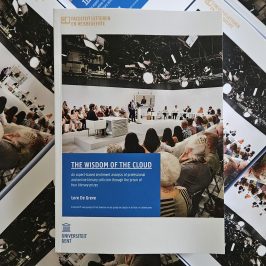
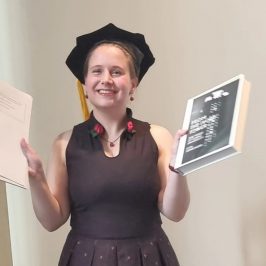
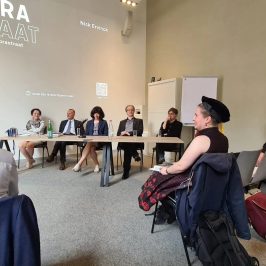
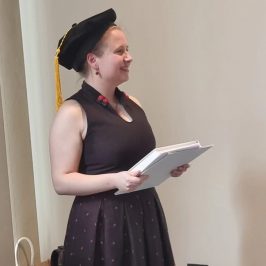
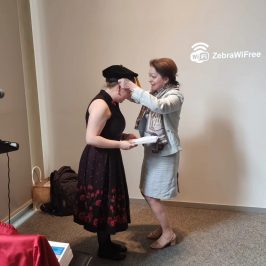
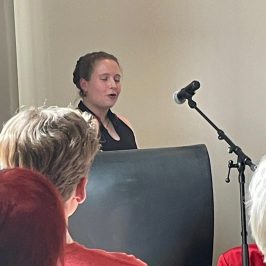
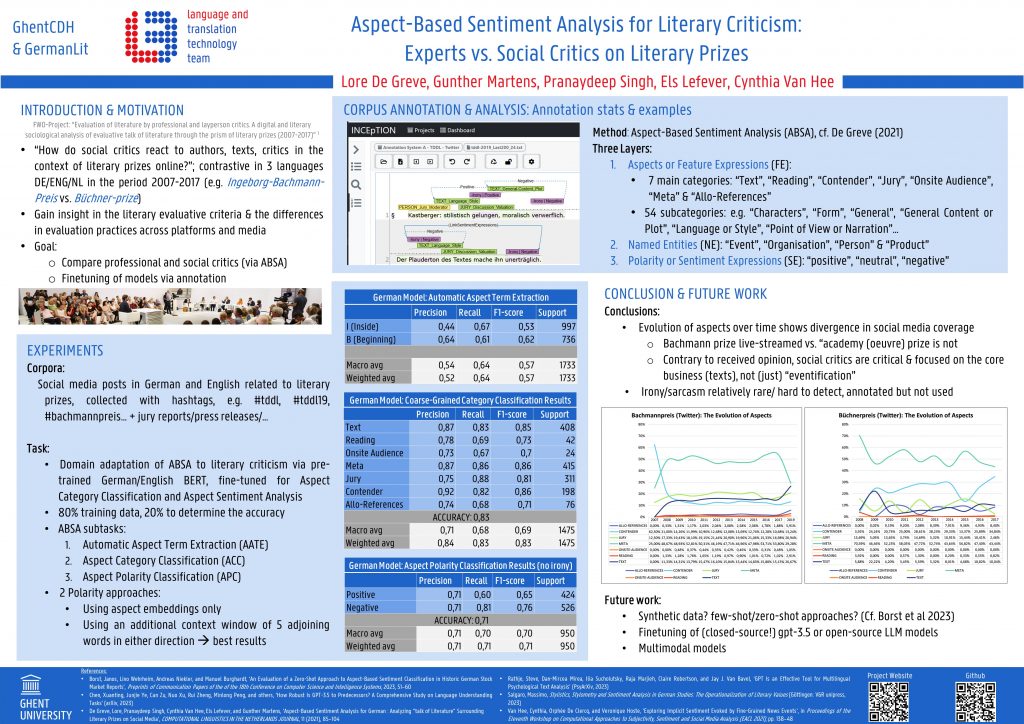
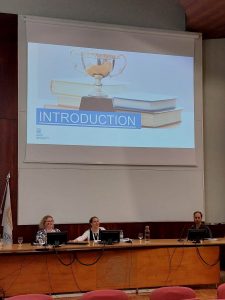 “So much for literary democracy”: Journalistic Capital and the The Influence and Reception of Scandal Surrounding Literary Prizes on Social Media
“So much for literary democracy”: Journalistic Capital and the The Influence and Reception of Scandal Surrounding Literary Prizes on Social Media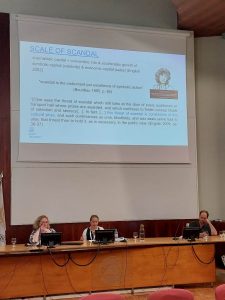 Bibliography:
Bibliography: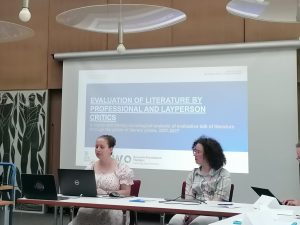
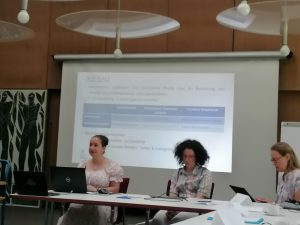
 In July, I once again participated in the SHARP Conference (
In July, I once again participated in the SHARP Conference (